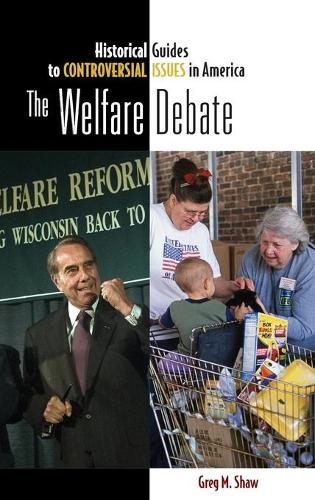
The Welfare Debate
(Hardback)
Publishing Details
The Welfare Debate
By (Author) Greg M. Shaw
Bloomsbury Publishing PLC
Greenwood Press
30th September 2007
United States
Classifications
General
Non Fiction
362.973
Physical Properties
Hardback
216
Description
Welfare politics have now been part of American life for four centuries. Beyond a persistent general idea that Americans have a collective obligation to provide for the poorest among us, there has been little common ground on which to forge political and philosophical consensus. Are poor people poor because of their own shortcomings and moral failings, or because of systemic societal and economic obstacles That is, does poverty have individual or structural causes This book demonstrates why neither of these two polemical stances has been able to prevail permanently over the other and explores the public policyand real-lifeconsequences of the stalemate. Author Greg M. Shaw pays special attention to the outcome of the 1996 act that was heralded as ending welfare as we know it. Historically, people on all sides of the welfare issue have hated welfarebut for different reasons. Like our forebears, we have constantly disagreed about where to strike the balance between meeting the basic needs of the very poor and creating dependency, or undermining individual initiative. The shift in 1996 from New Deal welfare entitlement to workfare mirrored the national mood and ascendant political ideology, as had welfare policy throughout American history. The special contribution of this book is to show how evolving understandings of four key issuesmarkets, motherhood, race, and federalismhave shaped public perceptions in this contentious debate. A rich historical narrative is here complemented by a sophisticated analytical understanding of the forces at work behind attempts to solve the welfare dilemma. How should we evaluate the current welfare-to-work model Is a precipitous decline in state welfare caseloads sufficient evidence of success Success, this book finds, has many measures, and ending welfare as an entitlement program has not ended arguments about how best to protect children from the ravages of poverty or how to address the plight of the most vulnerable among us.
Reviews
Since colonial times, says Shaw (political science, Illinois Wesleyan U.) Americans have agreed that poor people should be provided with at least a minimal subsistence, though throughout the country's history controversies have raged about how and how much. To provide background for people engaged in or interested in the debate today, he traces the history of welfare from the early republic to neoliberalism. * SciTech Book News *
Author Bio
Greg M. Shaw is an Associate Professor in the Department of Political Science at Illinois Wesleyan University. He has published numerous articles in professional journals such as Public Opinion Quarterly, Policy Studies Journal, and Political Research Quarterly, chiefly on poverty issues and public opinion analysis.
